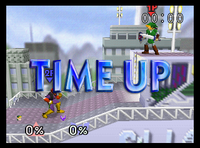Time out
- Not to be confused with pause.

A time out refers to the event of when the match timer reaches zero. When this happens, the screen will display "TIME" ("TIME UP" in the Japanese, Korean and Chinese versions as well as the original Super Smash Bros. in all regions) and the announcer will call it. Time, Coin, and Bonus matches all usually require a time out to occur in order to make it official, because the game modes require the player to perform specific tasks within the time limit in order to win; though it is possible to play "unwinnable" matches via the ∞ setting for time battles. Within Stock battles (and Stamina Mode battles as of Ultimate), matches can also be won via timing out, though this requires the match itself to have a match timer on during it.
If there is a tie of percentages and sometimes points or stocks in all game modes when a time out takes place, Sudden Death occurs. However, Tourneys in Super Smash Bros. for Wii U instead grant the player who dealt the largest amount of damage overall the win instantly.
In tournaments
By default, the tournament ruleset for all games in the series requires a time limit in stock matches; as Super Smash Bros. lacks an ability to do this, such matches are often played with an observer using an external stopwatch, or an ordinary time match is played, with the match ending after one player has been KO'd a specific number of times. Some Smash 64 tournaments hack in a time limit.
Under most circumstances, a time out in tournament play causes the player with more stocks winning the match; assuming both players or teams have equivalent stocks, then the player or team with less damage is declared the winner. Under the rare circumstance that the players or teams have identical damage or otherwise tie a match outside of timing out, a one stock rematch is played on the same stage with the same characters.
The legitimacy of timing out as a strategy, however, is controversial. Some smashers have claimed that timing out is a cheap and unsportsmanlike tactic, and the tactic has also been described as requiring camping and stalling in order to work, both of which are unpopular methods to play. Other smashers, however, claim that winning via time outs requires its own strategy to consistently pull off, and that characters with relatively poor KOing ability yet great defensive ability, such as Samus and Sonic, require the use of timing out in order to remain competitive.
The time out issue in Smash 64 can be significant on stages like Hyrule Castle in certain matchups. A primary example of this is a match of Mew2King vs. Stranded, in which Mew2King manages to stall on the left side of the stage for nearly four minutes without either player taking any damage. This issue is significant in this position as it is extremely difficult for Captain Falcon to approach Kirby safely without getting lured into a combo, as long as the Kirby player keeps spacing up tilts and back airs. This is one of the main reasons Hyrule Castle has since been banned in most tournaments.
The effectiveness of timing out depends mostly on the length of time specified by the ruleset; the more time is allowed, the less viable timing out is. At the same time however, time limits longer than a certain point do nothing but make matches run longer than necessary; if a player is successfully camping out the opponent, an extra few minutes does nothing but lessen the opponent's drive to counter and delay the camper's win.




